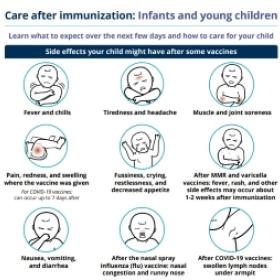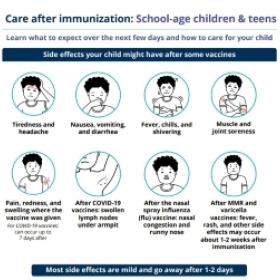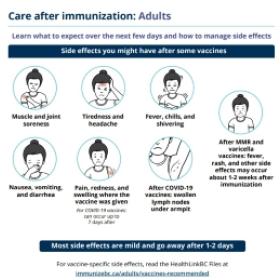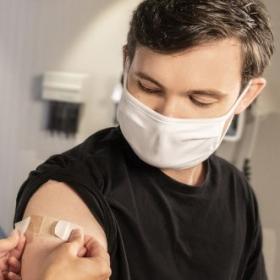On March 31, the ImmunizeBC website will move over to HealthLinkBC.ca After this date, you will be automatically redirected to HealthLink BC’s Immunization landing page. HealthLink BC provides trusted health information online and over the phone 24 hours a day, seven days a week by calling 8-1-1.
Date last reviewed:
Tuesday, May 28, 2024
HealthLinkBC
Available in Français (French), Español (Spanish), یسراف (Farsi), 한국어 (Korean), ਪੰਜਾਬੀ (Punjabi), and other languages.
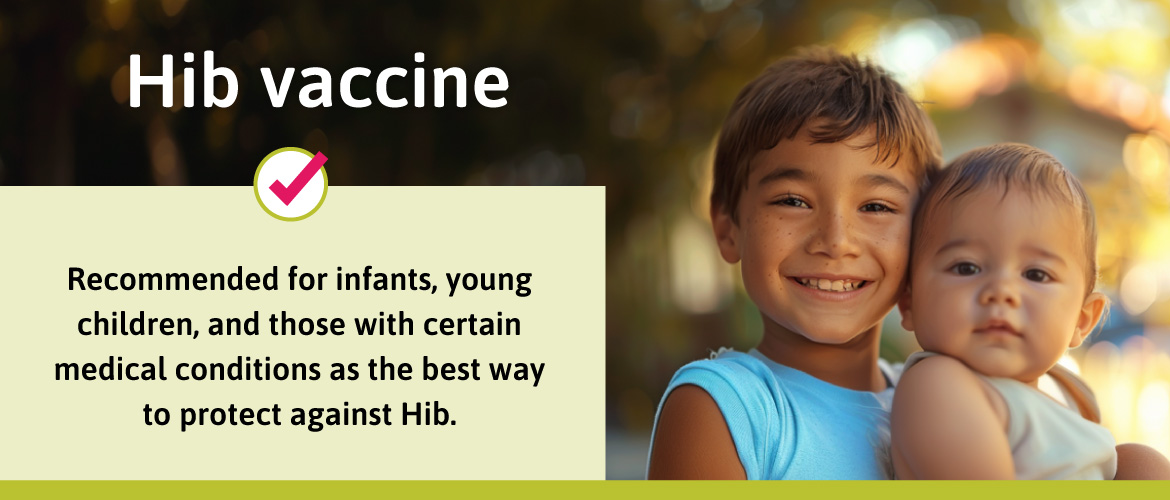
Disease it protects against
The Hib vaccine protects against:
- Haemophilus influenzae type b (Hib)
Hib can cause serious illness, hospitalization, and death. It usually infects children under 5 years of age. For every 20 children who get sick, 1 may die. Learn more about Hib.
Fact
Did you know?
Despite its name, Haemophilus influenzae type b is not the same as influenza (the flu).
Who should get the vaccine
| Age | Schedule |
|---|---|
| Infants & young children |
|
| School-age children & teens |
|
| Adults |
|
How well it works
Almost 100% of people who have received all the recommended vaccine doses are protected against Hib.
When your child gets immunized, you help protect others as well. People who are immunized are much less likely to catch a preventable disease and spread it to others.
Fact
Did you know?
Before the introduction of the Hib vaccine in 1988, about 1500 cases of Hib meningitis (a serious and life-threatening infection) occurred in Canada in children under the age of five. Since the vaccine, Hib infections have almost disappeared in Canada.
Safety
Vaccines are very safe and getting the vaccine is much safer than getting Hib. Vaccine safety is a top priority in Canada. Every vaccine must be shown to be safe and effective before it is approved for use. After approval, the safety of vaccines is continuously monitored. Learn more about vaccine safety.
Side effects
Many people have no side effects from vaccines. For those that do, they are usually mild and go away on their own within a few days. Serious side effects are very rare.
Common reactions to the Hib vaccine may include:
- Redness, swelling, and soreness where the vaccine was given
- Fever
- Some children may have drowsiness, fussiness, vomiting, diarrhea and persistent crying
It is important to stay at the clinic for 15 minutes after your vaccine. Some people may have a rare but serious allergic reaction called anaphylaxis. If anaphylaxis happens, you will get medicine to treat the symptoms.
Let your immunization provider/clinic or health care provider know if you or your child have any serious or unexpected side effects after immunization.
How to manage side effects
For information on how to manage side effects, view the immunization aftercare sheets below.
Who should not get the vaccine
Speak to your health care provider if you or your child has had a life-threatening reaction to a previous dose of Hib vaccine or to any component of the vaccine.
There is no need to delay getting immunized because of a cold or other mild illness. However, if you have concerns, speak to your health care provider.
Haemophilus influenzae type b (Hib) quick facts
- What is Haemophilus influenzae type b (Hib)?
-
Hib infection is caused by the Haemophilus influenza type b bacteria. It usually infects children under 5 years of age. Hib can cause serious and life-threatening illnesses, such as bacterial meningitis (inflammation of the lining of the brain) and septicemia (infection of the blood).
- How does it spread?
-
Hib spreads from person to person through coughing, sneezing or close face-to-face contact. Some people don’t have symptoms but can still spread the disease. Babies and children can become sick through sharing soothers, bottles or toys used by other children.
- What are the symptoms and risks?
-
Hib infection usually starts suddenly with:
- Fever
- Vomiting
- Lack of energy
- Confusion
- Headache
- Stiff neck
Hib can cause serious and life-threatening infections, including meningitis (an infection of the lining that covers the brain) and septicemia (an infection of the blood).For every 20 children who get sick, 1 may die. Permanent complications of infection include brain damage and deafness.Hib bacteria can also cause a serious and life-threatening infection in the throat called epiglottitis. A child with this infection may have severe difficulty breathing and may need an emergency operation to help breathe.
